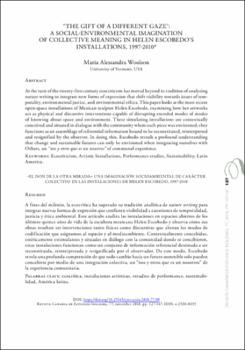“The Gift of a Different Gaze”: A Social-Environmental Imagination of Collective Meaning in Helen Escobedo’s Installations, 1997-2010
Author
Woolson, Maria AlessandraDate
2018Abstract
A fines del milenio, la ecocrítica ha superado su tradición analítica de nature writing para
integrar nuevas formas de expresión que confieren visibilidad a cuestiones de temporalidad,
justicia y ética ambiental. Este artículo analiza las instalaciones en espacios abiertos de los
últimos quince años de vida de la escultora mexicana Helen Escobedo y observa cómo sus
obras resultan ser intervenciones tanto físicas como discursivas que alteran los modos de
codificación que asignamos al espacio y al medioambiente. Contextualmente concebidas,
estéticamente estimulantes y situadas en diálogo con la comunidad donde se concibieron,
estas instalaciones funcionan como un conjunto de información referencial destinada a ser
reconstituida, reinterpretada y resignificada por el observador. De este modo, Escobedo
revela una profunda comprensión de que todo cambio hacia un futuro sostenible solo pueden
concebirse por medio de una integración colectiva, un “nos y otros que es un nosotros” de
la experiencia comunitaria. At the turn of the twenty-first century ecocriticism has moved beyond its tradition of analyzing
nature writing to integrate new forms of expression that shift visibility towards issues of temporality,
environmental justice, and environmental ethics. This paper looks at the most recent
open-space installations of Mexican sculptor Helen Escobedo, examining how her artworks
act as physical and discursive interventions capable of disrupting encoded modes of modes
of knowing about space and environment. These simulating installations are contextually
conceived and situated in dialogue with the community where each piece was envisioned; they
functions as an assemblage of referential information bound to be reconstituted, reinterpreted
and resignified by the observer. In doing this, Escobedo reveals a profound understanding
that change and sustainable futures can only be envisioned when integrating ourselves with
Others, un “nos y otros que es un nosotros” of communal experience.





